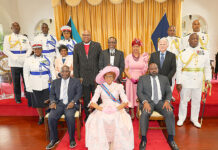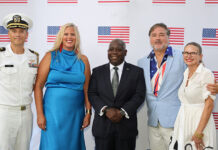
NASSAU, The Bahamas — Prime Minister the Rt. Hon. Perry G. Christie said the signing of the Nassau Accord 30 years ago was a “remarkable and historic event” that had a profound and riveting effect on the course of history, and, in particular, the history of South Africa.
“It contributed to the ending of Apartheid in South Africa and the subsequent freedom of Nelson Mandela and his compatriots who had languished in prison for some 27 years, based purely on the reasons that they had sought justice, sought freedom and equality of rights and privileges in their native South Africa,” Prime Minister Christie said during a ceremony commemorating the anniversary of the signing, which was a part of the Caribbean Musik Festival events, held in Rawson Square, on October 29, 2015.
Prime Minister Christie said the dominant issue at the 1985 Commonwealth Heads of Government Meeting was the apartheid in South Africa and whether sanctions should be used to end it. He gave a brief overview of the treatment of black South Africans at that time — highlighting the plight of the Mandelas — as well as what was being done by relevant world leaders about the situation.
“In the United States, at the time, President Ronald Reagan had vetoed U.S. sanctions against South Africa,” Prime Minister Christie pointed out. “Similarly, the conservative government in the United Kingdom under Prime Minister Margaret Thatcher also opposed using sanctions against South Africa.”
Some Commonwealth countries, he added threatened to revoke Zambia’s membership in the Commonwealth. Prime Minister Christie said the then Prime Minister of The Bahamas the late Rt. Hon. Lynden Pindling was allied with the African “front-line” nations that were against the British policy with respect to Rhodesia-Zimbabwe and the opposition to use economic sanctions to end the white Rhodesian regime.
When CHOGM met, Prime Minister Christie said there was a clear divide between Commonwealth countries on Apartheid.
“It was in this moment of challenge, when the continued existence of the Commonwealth itself was threatened, that a black Bahamian from East Street — who had risen from the working classes of parents from The Bahamas and Jamaica — was to emerge as a statesman, even when he faced his greatest challenge at home,” Prime Minister Christie said.
He went on to relate that Prime Minister Pindling’s formative years in the working class community of Grants Town and as a student at the Government High School, as well as his rising political consciousness as a foreign student in London in the 1950s about the anti-colonial struggles in Africa, Asia and the Caribbean, were all to prepare him for the role he was to play in guiding The Bahamas to majority rule and political independence.
“His diplomatic skills convincing Sir Alvin Braynen and Sir Randol Fawkes to support the Progressive Liberal Party helped to forge the great historical compromise that led to the first majority rule P.L.P. Government in 1967,” Prime Minister Christie said.
Prime Minister Christie said that at CHOGM in 1985, Sir Lynden was “supremely prepared” to lead the Commonwealth, and to lead with imagination and courage, in standing firm on the principle of universal adult suffrage for South Africans.
“With his close friend Shridath ‘Sonny’ Ramphal, as Commonwealth Secretary General, Sir Lynden used his diplomatic skills to win the support of Australia, Canada and New Zealand for a comprehensive package of economic measures against apartheid in South Africa,” Prime Minister Christie said.
Prime Minister Christie explained that the Nassau Accord, which was affirmed by all of the Heads at the 8th CHOGM, had two key platforms.
Firstly, Prime Minister Christie said it called on the government of South Africa to dismantle its apartheid policy and enter into negotiations with the country’s black majority and end its occupation of Namibia. Secondly, he continued, it appointed the Commonwealth Eminent Persons Group which was charged with the task to investigate the South African issue and report back with recommendations ahead of the special 1986 CHOGM in London.
Prime Minister Christie contended that, all things being equal, it is highly unlikely that prior sessions of CHOGM and those that have followed in subsequent years — including those he had attended, and right up to the present time — have had a more galvanizing effect on the history of the Commonwealth than the outcome that was “sealed” at the 8th Meeting of CHOGM through the declaration known as the Nassau Accord.
“My reasons for asserting this is that the Nassau Accord made a clean break with previous discussions on the situation in South Africa,” Prime Minister Christie said. “Principally, it established an urgency to deal with the issues of apartheid and the black majority rule.
“This led to an acceleration of the pace of negotiations within and outside of the Government of South Africa and in the international community, all of which eventually led to the release of Nelson Mandela in 1990, and which by 1994 ushered in the first ever elections conducted under universal adult suffrage in that nation,” he added.
“As we all can recall, Nelson Mandela handily won this election, thus ushering in majority rule for the first time in the modern history of South Africa.”







